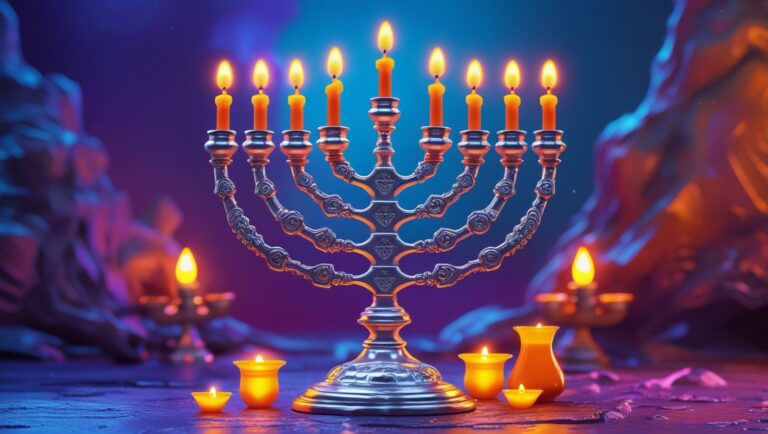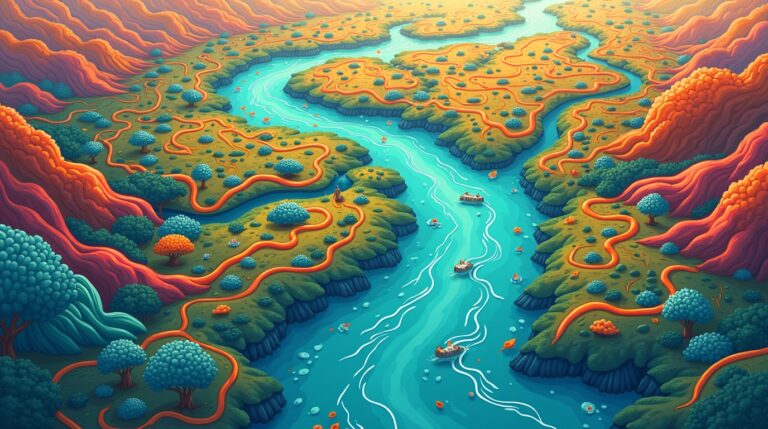Sefer Shaarei Kedusha teaches us that envy and jealousy are rooted in the water element
If you haven’t read the article on the fire element, you can find it here. Since we already gave an introduction there, we can skip it here.
Starting from the book Shaarei Kedusha itself:
The Element of Water
Water, as the source of all life and growth, embodies the desire for pleasure and indulgence. It nurtures the physical world, causing all that is pleasurable to flourish. However, this element also manifests in two negative traits:
Jealousy – When one sees the success or wealth of a friend, jealousy arises, wishing to have what the other possesses, fostering resentment.
Envy – This stems from the craving for what belongs to another, leading one to covet their property, seduce their spouse, or pursue anything that brings another joy.
Water element and humility
Continuing from Shaarei Kedusha:
Our sages, of blessed memory, taught: “Why are the words of Torah compared to water? To teach us that just as water descends from a high place and flows to a lower place, so too, Torah only rests upon one who is humble in spirit.” Fortunate is the person who remains calm and steadfast, whose spirit is deeply humble and modest, as it is written: “The sacrifices that God desires are a broken spirit.”
Blessed is the one who shows patience and endures all things for the sake of the Creator, making himself like a mere remnant, as the verse says: “Who is a God like You, pardoning iniquity and overlooking transgression for the remnant of His heritage,” meaning, for those who see themselves as the remnant.
Fortunate is the person who humbles himself like dust, trodden by all, who becomes like the lowly threshold upon which others tread, and the lowest peg upon which all depend.
The State of Flow
In psychology, the state of flow refers to a mental state in which a person becomes fully immersed and engaged in an activity, losing track of time and self-consciousness. Coined by psychologist Mihály Csíkszentmihályi, flow is often described as a state of optimal experience, where one is completely absorbed in what they are doing and feels a sense of effortlessness and mastery. This state typically arises when a person’s skills are well-matched to a challenging task, creating a perfect balance between action and awareness.
In Kabbalah this is associated with the Sephira of Chokhmah (spiritual wisdom), which is a very powerful and pleasant state. Though Chokhmah is associated with wind, it is also associated with water.
The concept of flow can be likened to the nature of the water element, which moves fluidly and gracefully, adapting to its environment while maintaining a sense of direction. Like water, the state of flow is marked by a seamless movement from one moment to the next, without resistance or disruption. Water flows effortlessly when unhindered, much like the mind in flow moves smoothly and naturally when fully engaged in a task that resonates with one’s abilities and purpose.
In a spiritual context, as taught in Shaarei Kedusha, the concept of desire is fundamental to spiritual elevation. Just as water seeks to descend from a high place to a low place, spiritual desire begins in a higher realm and flows downward, seeking to manifest itself in the physical world. Many Kabbalists like the Ramak (Rabbi Moshe Cordovero) and the Ramchal (Rabbi Moshe Chaim Luzzatto) write that one needs to have a very strong desire to connect to his spiritual soul-root in order to experience the spiritual worlds. The flow of desire is then reversed from top-down to bottom-up.
Yet, this spiritual flow requires alignment with God’s will, where one’s desires are channeled towards fulfilling the higher purpose of the soul. This is the essence of spiritual elevation, where one can receive information he’d not have been able to otherwise.
We see a comparison then: When spiritual desire flows naturally, it leads to a state of connection with Hashem, similar to how flow in psychology leads to a state of connection with the task at hand.
The alignment of psychological flow and spiritual desire can also be seen in how both require a level of self-transcendence. In flow, the ego dissolves as one becomes fully absorbed in the moment, while in spiritual practice, the ego is diminished to allow the soul to connect with the greater Divine flow.
This parallel illustrates the powerful link between the two experiences: both are processes of surrendering to something larger, whether that is the task in flow or the spiritual currents that guide a person’s life in the pursuit of kedusha (holiness).
Spiritual Symbolism of Water Element
One additional insight into the connection between the state of flow and the water element is the idea of surrender which we just mentioned. In both psychological flow and spiritual practices, there is a need to release control and allow oneself to be carried by the current of the moment. Just as water does not resist the shape of the riverbed, a person in a state of flow surrenders to the task at hand without overthinking or forcing outcomes.
This surrender isn’t passive—it’s an active engagement that allows for creativity and intuition to emerge naturally. In spiritual elevation, surrendering to Hashem’s will mirrors this process, where one releases personal ego and trusts in the guidance of a higher power.
By letting go, we create space for deeper insight, connection, and growth, both in our work and spiritual lives. And this is a skill that can be taught.
Here’s a summary of some of the many properties of the water element:
- Purification and Renewal
Water is universally associated with purification. Just as water cleanses physical impurities, it symbolizes the purification of the soul and renewal of spirit. In Kabbalah, water is linked to the process of teshuvah (repentance), washing away spiritual blemishes and renewing the connection with Hashem, and the Mikvah. - Flexibility and Adaptability
Water is known for its ability to take the shape of any container and flow around obstacles. Spiritually, this teaches us the value of flexibility and adaptability in life. A person influenced by the water element (its positive side) learns to navigate life’s challenges fluidly, bending without breaking, and finding a way through even the most difficult circumstances. - Depth and Emotional Sensitivity
Just as the depths of the ocean are vast and mysterious, water represents the depths of human emotion. Those aligned with the water element often experience a heightened emotional sensitivity, intuition, and a deep capacity for empathy. Water is closely tied to the emotional world, teaching us to embrace and explore the inner currents of our feelings. As our sages teach: The gates of tears are also never closed! - Sustenance and Growth
Water is essential for all living things, nourishing and sustaining life. In Kabbalah, water also represents the flow of shefa (divine sustenance) that nurtures the soul. It reminds us of the importance of spiritual practices that nourish our inner being, much like water sustains the body. - Connection and Unity
Water has the ability to unite different elements by blending them together. In Kabbalistic thought, water represents the force of connection, whether between people, between the soul and Hashem, or between different aspects of one’s inner self. In Halacha, water makes food or a kli (vessel) mukhshar, meaning, able to receive Tumah. - The Flow of Divine Wisdom
Just as water flows downward from higher to lower places, so too does spiritual wisdom flow from the spiritual realms to those who are humble and open to receiving it. The metaphor of water descending from on high reminds us that true wisdom is received when we empty ourselves of ego and make space for higher truths to flow into our consciousness. In other words: when we accept we don’t know everything there is about a certain subject and keep our minds open. - Life Force and the Power of Creation
Water is also associated with the potential for creation. It is the element that nourishes the seeds and brings them to life. In this sense, water represents the creative power within each of us—the ability to nurture ideas, dreams, and aspirations, allowing them to grow into reality. - Balance Between Desire and Restraint
The water element is tied to pleasure and desire, as it is the source of growth and enjoyment. However, unchecked desire can lead to excess and imbalance. Spiritually, water teaches us the importance of balancing our desires with restraint, using our cravings for pleasure in ways that uplift the soul rather than pulling it downward into material attachment.
Concluding remarks
As with everything, the water element can also be corrupted and manifest as lust and envy. From Shaarei Kedusha:
The lust for pleasure is more destructive than any of the negative traits mentioned before. A person consumed by gluttony will inevitably fall into greed, theft, false oaths, hatred of others, and envy. Such a person mirrors Esav, who said, “Please pour some of that red, red stuff into me,” driven by insatiable desire.
About such an individual, it is said: “If you care for your soul, it is better to put a knife to your throat.” For gluttony can eventually lead one to eat forbidden foods, such as the meat of an animal that died naturally (Neveilah) or was improperly slaughtered (Treifah), as well as other prohibited things. As it is written, “All of man’s toil is for his mouth,” and, “The stomach of the wicked will always be lacking.”
We learned oth the state of flow in psychology and the spiritual concept of flow, as described in Shaarei Kedusha, share the same principles: movement, connection, and purpose. Whether we’re pursuing a goal or connecting with something higher, embracing the nature of water—flowing smoothly and adapting without resistance—helps us stay aligned with our path.
By channeling our desires in a focused and balanced way, we can experience greater fulfillment, whether in daily tasks or in our spiritual journey. It’s all about finding that balance and letting life flow.
May Hashem grant us the wisdom to use our water element and connect with it for holy purposes.







